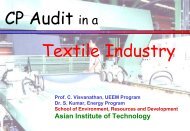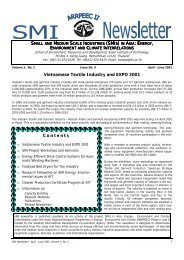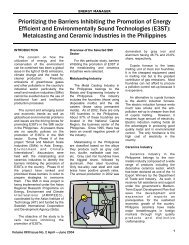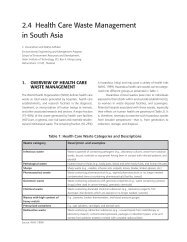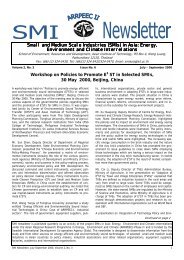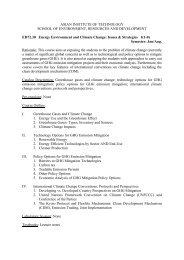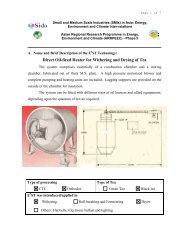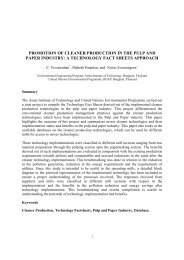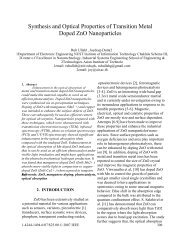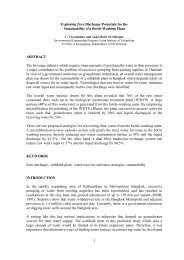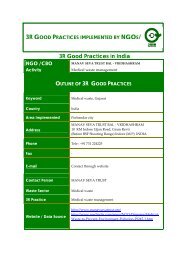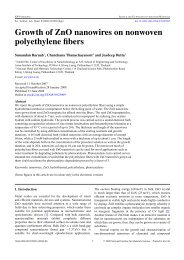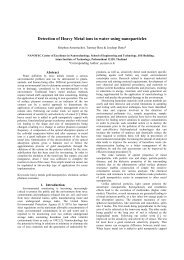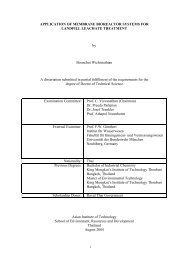A Gap Analysis in Selected Asian Countries, 3R Knowledge Hub ...
A Gap Analysis in Selected Asian Countries, 3R Knowledge Hub ...
A Gap Analysis in Selected Asian Countries, 3R Knowledge Hub ...
Create successful ePaper yourself
Turn your PDF publications into a flip-book with our unique Google optimized e-Paper software.
34<br />
<strong>3R</strong> <strong>Gap</strong> <strong>Analysis</strong> and F<strong>in</strong>d<strong>in</strong>gs<br />
Handl<strong>in</strong>g LAB<br />
without proper<br />
safety measures<br />
Image source: SBC (ULAB Project Cambodia)<br />
URBAN MUNICIPAL WASTE<br />
From 1979 to 1993 the Department of Public<br />
Works and Transport (DPWT) was responsible<br />
for solid waste collection after which this sector<br />
has been privatized. The follow<strong>in</strong>g agencies<br />
have carried out the solid waste management <strong>in</strong><br />
the City.<br />
• June 1994 to July 1995<br />
- Pacific <strong>Asian</strong> Development, France<br />
• Aug 1995 to Dec 1995<br />
- Local Adm<strong>in</strong>istration<br />
• Jan 1996 to Nov 1996<br />
-Public Cleans<strong>in</strong>g Company, Cambodia<br />
• Dec 1996 to Jul 1997<br />
- Environment Development Company,<br />
Germany<br />
• July 1997 to date<br />
- PSBK, Cambodia (a private sector waste<br />
management agency)<br />
Although at present a private company is<br />
responsible for collection and transport of solid<br />
waste <strong>in</strong> the entire city, the waste management<br />
system <strong>in</strong> Phnom Penh is still reported to be<br />
poor. It is estimated that 70% of the waste <strong>in</strong><br />
urban districts is collected and maximum of 80%<br />
of the households are connected to the service<br />
(ACHR, 2002).<br />
Though four urban districts are covered, most of<br />
the poor urban communities do not receive such<br />
service. PSBK is responsible for collect<strong>in</strong>g waste<br />
from the City as a whole, transport<strong>in</strong>g and<br />
dispos<strong>in</strong>g them <strong>in</strong> the disposal sites identified<br />
by the Municipality of Phnom Penh (MPP).<br />
The Clean<strong>in</strong>g Authority of Phnom Penh, now<br />
called The Phnom Penh Waste Management<br />
(PPWM) under DPWT, is supported by the<br />
Norwegian Agency for Development<br />
Cooperation (NORAD). A similar project<br />
supported by NORAD and ADB under the<br />
Water Supply and Dra<strong>in</strong>age Project is the<br />
Neighborhood Improvement Program (NIP)<br />
implemented by DPWT with technical<br />
assistance from Inter-Consult International. The<br />
ma<strong>in</strong> activities of NIP are to provide capacity<br />
build<strong>in</strong>g to PPWM and implement a pilot<br />
project on community based SWM.<br />
Community Sanitation and Recycl<strong>in</strong>g<br />
Organization (CSARO) is a local NGO that<br />
facilitates organiz<strong>in</strong>g community-based primary<br />
waste collection while PPWM is responsible for<br />
secondary collection, transport<strong>in</strong>g and<br />
dispos<strong>in</strong>g them <strong>in</strong>to the exist<strong>in</strong>g disposal sites.<br />
PPWM is also responsible for improv<strong>in</strong>g the<br />
conditions of the exist<strong>in</strong>g disposal sites and<br />
PSBK has to pay USD 6,000 per month to PPWM<br />
for this improvement. It is reported that waste is<br />
separated prior to secondary collection and<br />
brought to the community compost<strong>in</strong>g center.<br />
Apart from privatization and NIP, limited<br />
activities related to SWM and hygiene were<br />
taken by CSARO with objectives to improve<br />
liv<strong>in</strong>g condition of the poor <strong>in</strong> Phnom Penh, and<br />
to improve betterment (physical, social,<br />
economic) for waste pickers. The activities<br />
implemented by CSARO are community-based<br />
and target waste pickers only.<br />
Another ongo<strong>in</strong>g pilot project is on compost<strong>in</strong>g,<br />
funded by Municipality of Neufert, Germany.<br />
MPP allocated 2,000 m 2 of land at the exist<strong>in</strong>g<br />
landfill for compost<strong>in</strong>g. S<strong>in</strong>ce its <strong>in</strong>ception <strong>in</strong><br />
2000, the project has produced about 20 tons of<br />
compost per year.



